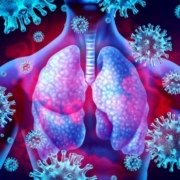BridgeBio announced that the Palo Alto, Calif.-based biopharmaceutical company signed an exclusive deal with Bristol Myers Squibb to develop and commercialize a potential treatment for cancer.
Checkpoint inhibitor pioneer James P. Allison, who won the 2018 Nobel Prize in Medicine, will helm a new research and innovation hub at The University of Texas MD Anderson Cancer Center that is focused on developing new immunotherapy breakthroughs in oncology.
Legend Biotech’s clinical trial of the company’s candidate drug for relapsed or refractory T-cell lymphoma was placed on hold effective February 11 after some issues were raised on the first patient dosed.
Texas A&M University Science Center, MD Anderson Cancer Center, and Pulmotect report that the drug PUL-042 appears to work against COVID-19 and other respiratory infections.
Although it’s difficult, when faced with a cancer diagnosis, it’s important to find the best health care facility to receive treatment. Improving the future of cancer tech, this posting looks at some of the most high-tech cancer hospitals in America.
UK Variant Not as Lethal as Originally Reported
Antibody-Drug Conjugates (ADCs), Breast Cancer, Brown Fat Cells, Cancer Immunology Research, COVID-19 Deaths, COVID-19 Variant B.1.1.7, Covid-19 Variants, Fat Cells, Harvard Medical School, Hospitalized COVID-19 Patients, Immune Cells, Lancet Infectious Diseases, Lancet Public Health, Massachusetts General Hospital, MD Anderson Cancer Center, Osteosarcoma, SARS-CoV-2 virus, Skin Cancer, T-Cells, The Ohio State University Wexner Medical Center, Tumors, WuhanA new study by researchers at the University College London (UCL) published in Lancet Infectious Diseases finds that although the U.K. variant of SARS-CoV-2 known as B.1.1.7 is more transmissible than the wild-type, original Wuhan strain, it is likely not more deadly.
ESMO News: AstraZeneca, Merck, Janssen, Amgen and More
Basal Cell Carcinoma, Blockbusters, Breast Cancer, Checkpoint Inhibitors, Clinical Data, Clinical Trial Endpoints, Clinical Trials, EGFR tyrosine kinase inhibitors (TKI), European Society for Medical Oncology (ESMO), Interim Data, MD Anderson Cancer Center, Melanoma, Metastatic Castration-Resistant Prostate Cancer (mCRPC), Metastatic non-small cell lung cancer, Non-Small Cell Lung Cancer (NSCLC), Overall Survival (OS), R&D, Renal Cell Carcinoma (RCC), Therapeutics, TumorsNumerous companies presented clinical trial data and updates at the European Society for Medical Oncology (ESMO) Virtual Congress 2020.
Paris-based Sanofi and Houston-based The University of Texas MD Anderson Cancer Center entered a five-year strategic partnership to develop immune therapies and targeted cancer treatments.
The immuno-oncology therapy CAR-T utilizes specific types of immune cells, T-cells, which are drawn from the cancer patient, supercharged and infused back into the patient. Now, The University of Texas MD Anderson Cancer Center has developed a slightly different approach using a different type of immune cell called Natural Killer (NK) cells.
The Department of Justice leveled more charges against members of the U.S. science community who have alleged ties to China.










